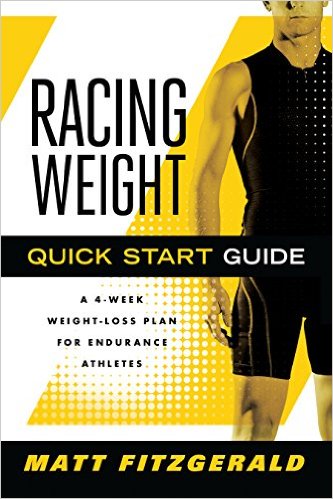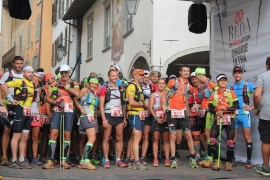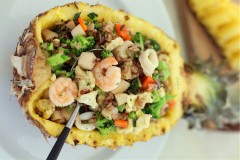Racing Weight: How to Get Lean for Peak Performance 2009电子书下载地址:
//www.nduoke.com/yundongshujixiazai/1934030511-racing-weight-download
关于作者Matt Fitzgerald更多资料见:
Matt Fitzgerald_运动营养学专家_Runner's World书籍作者-跑步作家-人物百科-跑步百科
//www.nduoke.com/renwubaike/matt-fitzgerald
Matt Fitzgerald出版的十多本畅销运动营养、跑步饮食书籍合集见:
Matt Fitzgerald(Runner's World运动营养学专家)书籍合集(附PDF电子书网盘下载地址)
//www.nduoke.com/running-books/matt-fitzgerald-books
《Racing Weight Quick Start Guide: A 4-Week Weight-Loss Plan for Endurance Athletes》简介:
If you're like most endurance ath letes, you're concerned about your weight. You know that every extra pound slows you down.
Matt Fitzgerald's Racing Weight Quick Start Guide applies all the principles of his best-selling book Racing Weight in a detailed set of weight-loss training plans. You will devote 4 to 8 weeks to starting a weight loss of 5, 10, or 20+ pounds.
Lose weight quickly by following a schedule of high-intensity workouts and strength training as well as a menu of calorie-restricted, high-protein meals and snacks. Low-volume and high-volume plans make it possible for cyclists, runners, and triathletes with a wide range of experience to maintain their training levels. Replace fat with muscle while keeping your appetite in check.
Once you've hit your quick start weight-loss goals, you will continue drop ping unwanted pounds using the proven strategies of the Racing Weight program. Zero in on your racing weight through improved diet quality, bal anced macronutrient levels, proper timing of meals and snacks, appetite management, and training for lean body composition.
The Racing Weight Quick Start Guide will accelerate your season goals so you'll be racing leaner and faster than ever before.
《Racing Weight Quick Start Guide: A 4-Week Weight-Loss Plan for Endurance Athletes》读者评论:
If you're like most endurance ath letes, you're concerned about your weight. You know that every extra pound slows you down.
Matt Fitzgerald's Racing Weight Quick Start Guide applies all the principles of his best-selling book Racing Weight in a detailed set of weight-loss training plans. You will devote 4 to 8 weeks to starting a weight loss of 5, 10, or 20+ pounds.
Lose weight quickly by following a schedule of high-intensity workouts and strength training as well as a menu of calorie-restricted, high-protein meals and snacks. Low-volume and high-volume plans make it possible for cyclists, runners, and triathletes with a wide range of experience to maintain their training levels. Replace fat with muscle while keeping your appetite in check.
Once you've hit your quick start weight-loss goals, you will continue drop ping unwanted pounds using the proven strategies of the Racing Weight program. Zero in on your racing weight through improved diet quality, bal anced macronutrient levels, proper timing of meals and snacks, appetite management, and training for lean body composition.
The Racing Weight Quick Start Guide will accelerate your season goals so you'll be racing leaner and faster than ever before.
I purchased and read racing weight and then this book, which I believe is more of a companion and not a stand alone product. If you want to get the most out of this book, read Racing Weight first. Racing weight provides a very sound evidenced-based rationale for how and why shedding extra pounds can help improve performance. The quick start guide provides very concrete steps for how to put that into action. Since I already had a fairly high level of cardiovascular fitness, I followed a hybrid version between the low and high volume plans for runners for 8 weeks and had excellent results. Since I am a runner and I only really closely read and followed the plan for runners, my review will focus on that aspect. I will also mention that I am an exercise physiologist and am reviewing this from not only that perspective but that as a consumer, since as a runner, I'm always looking for new ways to augment my training and have struggled to loose the weight I have expected to while training. Nutrition is also not my area of expertise, so I am always looking for good resources in this area.
I modified the plan to fit my needs but I really followed it very closely. As stated in the book it was VERY hard to get 30% of my intake in protein every day - I mostly hit the 20-25% mark, however. I also did not give up diet soda. I drew the line there! I did follow just about every other aspect very closely. I never did actually calculate my DQS, but rather shot to get the prescribed kcal with the correct protein% and take in as many high-quality foods as I could each day. Had I followed that part more religiously, I likely could have lost a bit more weight, but I struggle with carbohydrate cravings so I was still thrilled with the results. In the end over 8 weeks, I lost 10 lb of pure body fat and my running performance has dramatically improved. I don't think it can be overstated the importance of just focusing on weight loss rather than performance and implementing this plan during an off-season training cycle.
Among the stand out aspects of the book are promoting what I call "strength intervals" or doing hill work rather than speed work to build strength without risking injury and fasted long runs. Although I'm not sure it really helps you loose weight per-se, I think it helps boost beta-oxidation capacity and promote glycogen sparing when you do hit your performance training cycle. Also doing some high intensity work on the cycle as a cross-training tool is an excellent, excellent tool to boost high-intensity training volume without putting yourself and increased risk of injury.
My primary criticisms and where I didn't give this book 5 stars is that Mr. Fitzgerald failed to mention all the other physiologic and metabolic factors that will work against one loosing weight and the pitfalls of that (compensatory lower spontaneous activity etc.) and failed to provide any strategies for overcoming these factors. Its not just a simple math formula (kcal in - kcal out) as he would leave one to believe however infinitely more complicated! In addition some of the exercises described did not make sense in the progression he provided and have no gender specificity. For instance there is a leg curl exercise and inverted pushups exercise that I still cannot do nor can anyone that I've asked to perform these exercises, and they were introduced in week 1 of the program! I'm wondering if he did any test cases of these exercises with recreational athletes?
That being said if you are a runner or other endurance athlete and you've been struggling to loose weight, thinking it will just come off as you increase your mileage, STOP, read Racing Weight and follow this guide and you will have some very positive results. Going through this process will also help shape your thinking moving forward about nutritional choices beyond the weight loss cycle.
The original Racing Weight is a phenomenal book with an incredible amount of information backed up by hard data. This book starts off with a watered-down recap of Racing Weight, followed by a few meal plans and advice for losing weight. It is designed for the "off-season" which I did not know at the time of purchase, and is probably part of the reason I didn't find it too helpful. Additionally, I would have loved to see more vegetarian plans. The author admits to finding it difficult to get enough protein (30%) without overdoing calories in his one vegetarian plan; providing a bit more guidance would have been even more useful for me.
I'll probably go back to this book in the winter, when I'm not training quite as hard as I am now, and maybe it will help me even more than the original book already has. However, if you are thinking of purchasing this book and have not already read Racing Weight, I *highly* recommend buying that one before (or instead of) this one.
I like Matt Fitzgerald's nutrition pieces in Triathlete and other sports publications, and think Racing Weight the original book is very much worth reading. He obviously knows his stuff. But I was disappointed in the quick start guide.
The first 42 pages are an overview of everything in the original book. The next section is the actual 4-week plan where he gives you the meals and snacks to eat. I was just kind off put off by how basic and bland everything was. I mean, 'PB and J' and 'celery with PB'...? That's fine I guess, but kind of toddler-ish. And one of the dinners is: roasted turkey, quinoa, and boiled brussel sprouts. No spices, not the tiniest bit of oil or cooking spray. I think cardboard is sounding pretty good at this point. I get that this 4 weeks is about cutting fat and getting lean, but I think he could have just spent a little more effort on making the food appealing. Food can be low fat, healthy and taste good and there are some great cook books out there that do just that. Try Ellie Krieger's 'Food You Crave'. She gives all the nutrition info so you can stick to the calorie recommendations from the racing weight book. I swear I have nothing to gain from that! I'm just a foodie and athlete that likes my food to taste good and be healthy.
And finally, the whole second half of the guide has nothing to do with nutrition....it's all weight training and sport specific workouts. The weight training exercises and plans are great, but I think most of you athletes out there probably already have half a dozen books about these topics or already have coaches and training programs. I only looked at the triathlon section, but the first few weeks of the program consisted of a grand total of 3-4 hours A WEEK of swimming, biking, and running. So unless you are a true beginner, and I mean starting from literally zero training, I think this is way too easy. I'm a pretty average age grouper and I train 10-15 hours a week.
So all that said, I just want to repeat, the original book 'Racing Weight' by this author is excellent and will give you a great idea of how to lose weight as an athlete. I just think this quick start guide is unnecessary. You'd be better off getting the calorie level you need from the book, then finding a great cook book that is healthy and gives the nutrition info so you can stay within your calorie prescription.
更多减肥书籍:
减肥书籍(运动减肥|饮食减肥|科学减肥)大全://www.nduoke.com/jianfeishuji
减肥书籍_运动|饮食|科学减肥方式精选及下载://www.nduoke.com/jianfeishuji/jianfei
饮食书籍(健康饮食|运动营养|饮食减肥)精选及下载://www.nduoke.com/yinshishuji/yinshi
更多运动书籍下载见://www.nduoke.com/yundongshuji
一些必不可少的涉及到减肥方面的知识见:
营养与减肥//www.nduoke.com/nutrition-and-weight-loss
跑步减肥瘦身//www.nduoke.com/weight-loss
跑步营养食谱//www.nduoke.com/running-recipes
科学减肥://www.nduoke.com/tag/科学减肥
饮食减肥://www.nduoke.com/tag/饮食减肥
运动减肥://www.nduoke.com/tag/运动减肥




